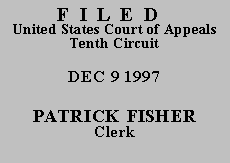

|
DAVID L. HILLIARD, |
|
Petitioner David L. Hilliard, appearing pro se, petitioned the district court for a writ of habeas corpus pursuant to 28 U.S.C. § 2254. The district court dismissed the petition and denied Hilliard a certificate of appealability for leave to proceed on appeal. Id. § 2253(c). This matter is before the court on Hilliard's application for a certificate of appealability.
Hilliard was convicted by a jury of conspiracy to commit robbery, robbery with a dangerous weapon, larceny of a motor vehicle, and assault and battery with intent to kill. On direct appeal, the Oklahoma Court of Criminal Appeals affirmed Hilliard's convictions for conspiracy, robbery, and larceny, but vacated his conviction for assault and battery on the grounds that conviction for both robbery and assault and battery violated the constitutional prohibition against double jeopardy. Hilliard failed in an attempt to have his remaining convictions overturned in a subsequent state petition for post-conviction relief. Hilliard then filed the instant petition pursuant to § 2254, claiming that (1) his convictions for conspiracy, robbery and larceny violate the Double Jeopardy Clause; (2) discriminatory peremptory strikes and improper comments by the prosecutor deprived him of his constitutional right to a fair trial; and (3) his trial and appellate counsel were ineffective for failure to raise the issues at trial and on appeal.
In an exceptionally thorough Report and Recommendation, a magistrate judge recommended that Hilliard's petition be denied. The magistrate noted that although Hilliard's double jeopardy and Batson claims were procedurally barred because they were not raised on direct appeal to the Oklahoma Court of Criminal Appeals, those claims had to be considered on the merits in order to decide the merits of Hilliard's ineffective assistance of counsel claims. As to Hilliard's double jeopardy claims, the magistrate judge noted that larceny, robbery and conspiracy were separate crimes under both Oklahoma law and the Supreme Court's decision in Blockburger v. United States, 284 U.S. 299 (1932). The magistrate judge concluded that Hilliard's Batson claim was meritless because it amounted to nothing more than a set of conclusory allegations.(1) In light of the fact that Hilliard's claims of error failed on the merits,(2) his claims of ineffective assistance of counsel also necessarily failed. After conducting a de novo review, the district court adopted the magistrate judge's Report and Recommendation in its entirety.
A habeas petitioner is entitled to a certificate of appealability only upon a "substantial showing of the denial of a constitutional right." 28 U.S.C. § 2253(c)(2). This court has held that the standard for granting a certificate of appealability under the § 2253(c) is the same standard set out by the Supreme Court in Barefoot v. Estelle, 463 U.S. 880 (1983). Lennox v. Evans, 87 F.3d 431, 434 (10th Cir. 1996), cert. denied, 117 S. Ct. 746 (1997), overruled in part on other grounds by, Lindh v. Murphy, 117 S. Ct. 2059 (1997). Under the Barefoot standard, a certificate of appealability will issue only where the petitioner has demonstrated the issues raised are (1) debatable among jurists of reason, (2) a court could resolve the issues differently, or (3) the questions presented are deserving of further proceedings. 463 U.S. at 893 n.4.
This court has conducted a de novo review of Hilliard's brief and application for a certificate of appealability, the magistrate's Report and Recommendation and district court's Order, and the entire record on appeal. In light of that review, we conclude that Hilliard has failed to make a "substantial showing of the denial of a constitutional right" for substantially the reasons set for in the magistrate judge's excellent Report and Recommendation dated January 16, 1997, and the district court's order dated April 30, 1997. Accordingly, this court DENIES Hilliard a certificate of appealability and DISMISSES the appeal.
ENTERED FOR THE COURT,
Michael R. Murphy
Circuit Judge
*. This order and judgment is not binding precedent, except under the doctrines of law of the case, res judicata and collateral estoppel. The court generally disfavors the citation of orders and judgments; nevertheless, an order and judgment may be cited under the terms and conditions of 10th Cir. R. 36.3.
1.The magistrate also concluded that Hilliard's appellate counsel was not ineffective in failing to raise the Batson claim on appeal. According to the magistrate judge, the claim would not have been apparent to appellate counsel because the voir dire portion of Hilliard's trial had not been transcribed. We conclude that the magistrate was correct to conclude that Hilliard's claims are far too conclusory to state a proper Batson claim and do not, therefore, rely on the cumulative justification that jury voir dire was not transcribed.
2.We note that although the magistrate judge concluded the issue was procedurally barred, it never reached the merits, for the purpose of evaluating the ineffective assistance of counsel claim, of Hilliard's contention that the prosecutor violated Hilliard's constitutional rights by repeatedly referring to Hilliard's race during opening and closing arguments. Nevertheless, this court has scoured the transcripts of the prosecutor's opening and closing arguments and has not found a single reference on the part of the prosecutor to Hilliard's race. Accordingly, Hilliard's contentions of prosecutorial misconduct and his related claims of ineffective assistance of trial and appellate counsel are utterly without merit.